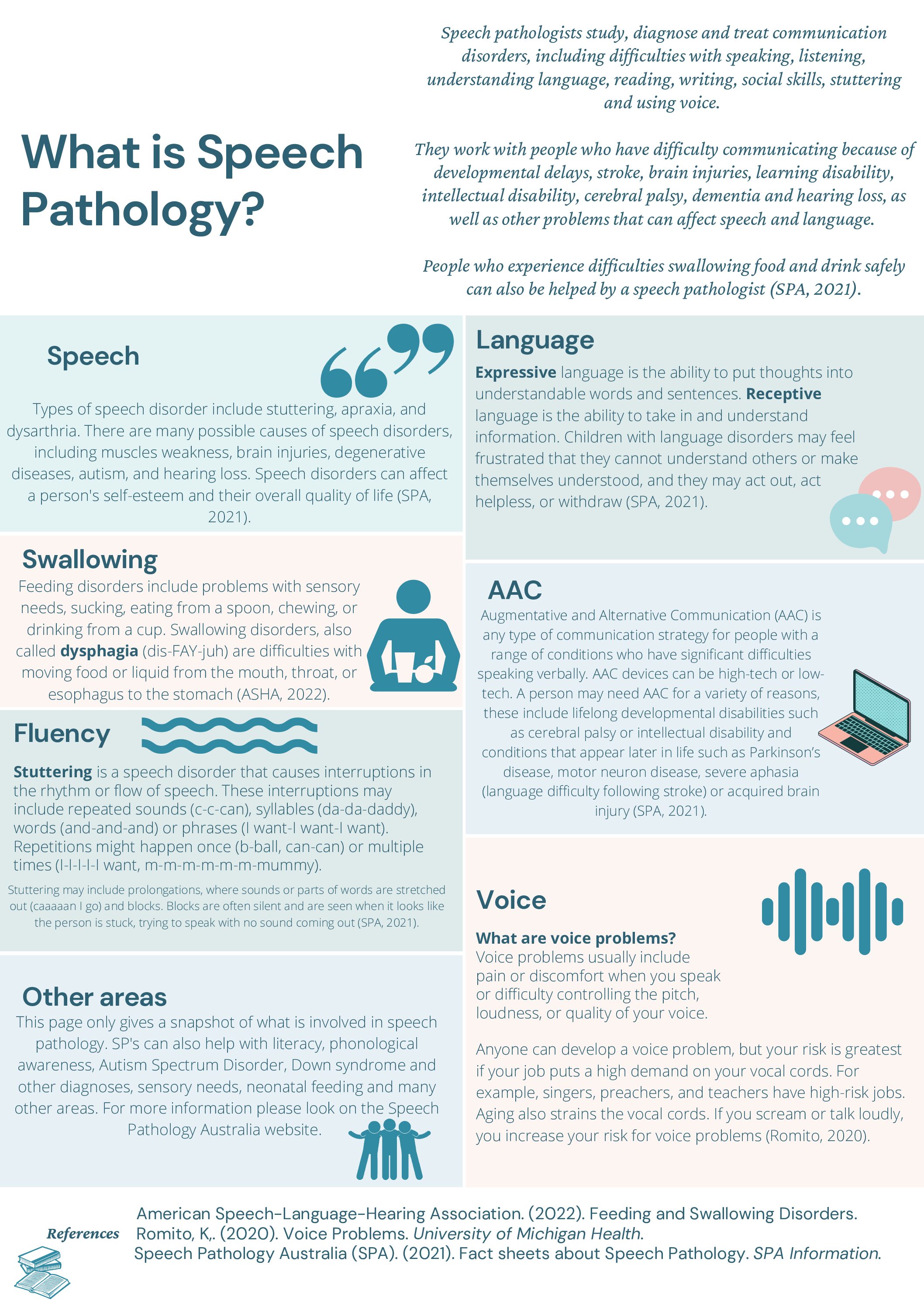SPEECH PATHOLOGY FOR KIDS
Our speech pathologists are all members of Speech Pathology Australia and are committed to providing evidence-based and client-centred therapy to support clients to achieve their goals. We provide services for to help with speech, language, fluency (stuttering), literacy, social communication and eating difficulties.
Our speech pathologists can support children with:
- Developing listening and comprehension skills
- Developing expressive language skills
- Developing social communication
- Developing literacy skills
- Developing smooth or fluent speech for children who stutter
- Developing safe eating and managing fussy eating
- Using alternative communication such as Key Word Sign, PECS, PODD and other AAC

What is a Speech Pathologist?
Speech pathologists study, diagnose and treat communication disorders, including difficulties with speaking, listening, understanding and using language, reading, writing, social skills, stuttering and using voice. They work with people who have difficulty communicating for a variety of reasons such as; developmental delays, traumatic brain injuries, learning or intellectual disability and hearing loss. People who experience difficulties with swallowing and feeding can also be helped by a speech pathologist.
Speech difficulties can arise for a variety of reasons including difficulty with sequencing motor movements meaning how the brain controls movements of the mouth, structures of the mouth such as a cleft palate, muscle weakness, delayed error patterns for speech sound production such saying “tup for cup” which we will elaborate on next week, difficulties with the articulation and pronunciation of speech sounds such as a lisp and many more. Speech disorders can affect a person’s intelligibility, self-esteem and their overall quality of life.
Language difficulties can arise for many reasons including; exposure to language in early childhood, genetic factors, traumatic brain injury and more. There are two main areas of language, understanding language (receptive) and use of language (expressive). Receptive language is the ability to take in and understand information. Expressive language is the ability to put thoughts into understandable words and sentences. Children with language disorders may feel frustrated that they cannot understand others or make themselves understood, and they may act out, act helpless, or withdraw.
Feeding disorders include problems with sensory needs, sucking, eating from a spoon, chewing, or drinking from a cup. Swallowing disorders, also called dysphagia are difficulties with moving food or liquid from the mouth, throat, or esophagus to the stomach.
Augmentative and Alternative Communication also known as AAC is any type of communication strategy for people with a range of conditions who have significant difficulties speaking verbally. AAC devices can be high-tech or low-tech. A person may need AAC for a variety of reasons, including developmental disabilities, intellectual disability as well as conditions that appear later in life such as Parkinson’s disease, motor neuron disease, or acquired brain injury.
Voice problems usually include pain or discomfort when you speak or difficulty controlling the pitch, loudness, or quality of your voice. Anyone can develop a voice problem, but your risk is greatest if your job puts a high demand on your vocal cords due to speaking loudly for consistent periods of time for example, singers and teachers have high-risk jobs.
Stuttering is a speech disorder that causes interruptions in the rhythm or flow of speech. These interruptions may include repeated sounds, syllables, words or phrases. Repetitions might happen once or multiple times. Stuttering may also include prolongations, where sounds or parts of words are stretched out and blocks which are often silent and are seen when it looks like the person is stuck, trying to speak with no sound coming out.
(Amelia Sharrad – AHA)



🧠 OT Skill Spotlight: Emotional Regulation
Does your child find it hard to calm down after getting upset?
You’re not alone — and there’s support available!
👉 Emotional regulation is the ability to manage feelings like
frustration, anger, or disappointment.
It’s key for:
✅ Getting along with others
✅ Learning at school
✅ Tackling daily challenges with confidence
💡 Try these at-home activities to support this skill:
🎈 Balloon breathing
🎨 Drawing their feelings
🧸 Pretend play with emotion faces
📦 Create a “calm box” with fidgets, soft toys, or favorite music
❤️ Want personalized support?
At Bounce Back Health, our experienced Occupational Therapists help
children and adults build life-changing emotional regulation skills —
and we have no OT waitlist!
📞 Call us: 08 8520 6244
📧 Email: infoge@bouncebackhealth.com.au ... See MoreSee Less
0 CommentsComment on Facebook
Occupational Therapy Areas for Autism
Occupational therapy (OT) plays a crucial role in supporting autistic
individuals by enhancing their independence, participation, and overall
well-being across multiple areas.
A detailed and structured list of OT focus areas for autism:
Sensory Processing & Regulation
👉 Helping individuals manage sensory sensitivities (e.g., noise,
textures, lights).
👉 Providing sensory integration therapy to improve responses to
sensory input.
👉 Creating sensory-friendly environments to support regulation.
👉 Developing sensory diets to help with self-regulation.
Social Skills Development
👉 Teaching social interaction skills (e.g., turn-taking, eye contact,
conversation).
👉 Facilitating group activities to practice socializing.
👉 Using role-playing and social stories to teach appropriate social
behaviors.
👉 Supporting perspective-taking and understanding social cues.
[…] ... See MoreSee Less
0 CommentsComment on Facebook
What is Occupational Therapy?
Helping kids build the skills they need for life!
Occupational therapy (OT) helps children develop essential motor,
sensory, social, and cognitive skills needed for everyday activities at
school and home, supporting everything from writing and coordination to
self-regulation and social skills.
OT can help with:
✔ Preschoolers – Developing independence, play skills, and school
readiness, while building confidence in social interactions.
🎒 School-age kids – Strengthening handwriting, coordination, and
balance, improving focus and emotional regulation, and supporting
sensory processing challenges.
🧩 Children with additional needs – Tailored support for autism,
ADHD, and sensory processing difficulties, helping with self-regulation,
social skills, and daily activities.
💡 Early support makes a big difference! If you think OT might help,
reach out today.
📞 Call us: 08 8520 6244
📩 Email us at info@bouncebackhealth.com.au
📍 Appointments available for clinic & school visits!
Our experienced OTs provide clinic and school-based therapy to help
children develop skills, build confidence, and thrive. ... See MoreSee Less
0 CommentsComment on Facebook
Join us at Bounce Back Health for our Board Game
Social Group!
This interactive session will help kids:
✅ Take turns & play fairly Learn
how to win & lose gracefully
✅ Follow game rules & problem-solve Work
together through collaboration & compromise
✅ Strengthen attention &
emotional regulation Improve hand-eye coordination & quick thinking
Games include Snakes & Ladders, Uno & Spot It!
Ages: 6 - 12 Date: 24th April Time: 10:00 - 11:30 AM Location: Bounce
Back Health Gawler East
Open to NDIS participants and private clients. Spaces are limited! Secure your child’s spot today.
Call us on: (08) 8520 6244
Email us at: infoge@bouncebackhealth.com.au ... See MoreSee Less
0 CommentsComment on Facebook
Join us at Bounce Back Health for our Cooking Social Group!
This hands-on session will help kids:
✅Learn to follow recipes and
practice kitchen safety
✅Develop fine motor & coordination skills through
measuring, mixing, and flipping
✅ Build social skills like teamwork,
turn-taking, and communication Gain independence & confidence in the
kitchen
Date: 22nd April Time: 10:30 AM - 12:00 PM Location: Bounce Back Health Gawler East
Open to NDIS participants and private clients. Spaces are limited! Secure your child’s spot today.
Call: (08) 8520 6244
Email: infoge@bouncebackhealth.com.au ... See MoreSee Less
0 CommentsComment on Facebook